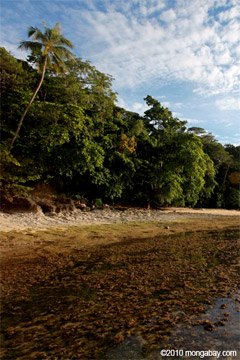
Dallying means less nature to study. Forest conversion for oil palm in Malaysia.
Conservation science, though mission-driven, often achieves only “tenuous relevance” to conservation policy, asserts a recent commentary in Biological Conservation.
As a remedy — and to help bridge the “large gulf between what scientists wish to produce and what they actually deliver” — the authors, led by William F. Laurance of James Cook University, explore steps that can increase the impact of new findings. They conclude that conservation scientists need to quickly respond to help assess time-sensitive policies and programs and critically evaluate conservation programs already in existence. They also argue that conservation scientists should not shy away from complex problems that require collaborations outside their home discipline.
 Seagrass and rainforest in Sulawesi. |
Some of the barriers highlighted by the authors impede the effectiveness of applied research regardless of discipline. Examples include the mismatch between rigorous analytical designs and messy real-world problems, and the demand among funding agencies for conceptually novel research. Yet the authors argue that many of these institutional barriers can be surmounted simply through better communication within the conservation community.
“As much as anything,” they write, “efforts to improve the relevance of conservation research involve a commitment to communication — in establishing an initial dialogue with conservation practitioners to help formulate research goals, and then working with stakeholders, decision makers, the popular media and general public to increase the likelihood that one’s key findings are widely understood and implemented in a time-critical manner.”
The authors’ closing remarks attempt a rallying cry: “For those possessed of a desire to influence conservation outcomes, there is both an open niche and a great need for such efforts. For individuals with the boldness and drive to attack such challenges, the door is open.”
CITATION: William F. Laurance, Harko Koster, Monique Grooten, Anthony B. Anderson, Pieter A. Zuidema, Steve Zwick, Roderick J. Zagt, Antony J. Lynam, Matthew Linkie, Niels P.R. Anten. Making conservation research more relevant for conservation practitioners. Biological Conservation 153 (2012) 164–168
Lisa Kelley is a graduate student in the Department of Environmental Science, Policy and Management at the University of California, Berkeley. Her research focuses on transitioning land use in Indonesia.
Related articles